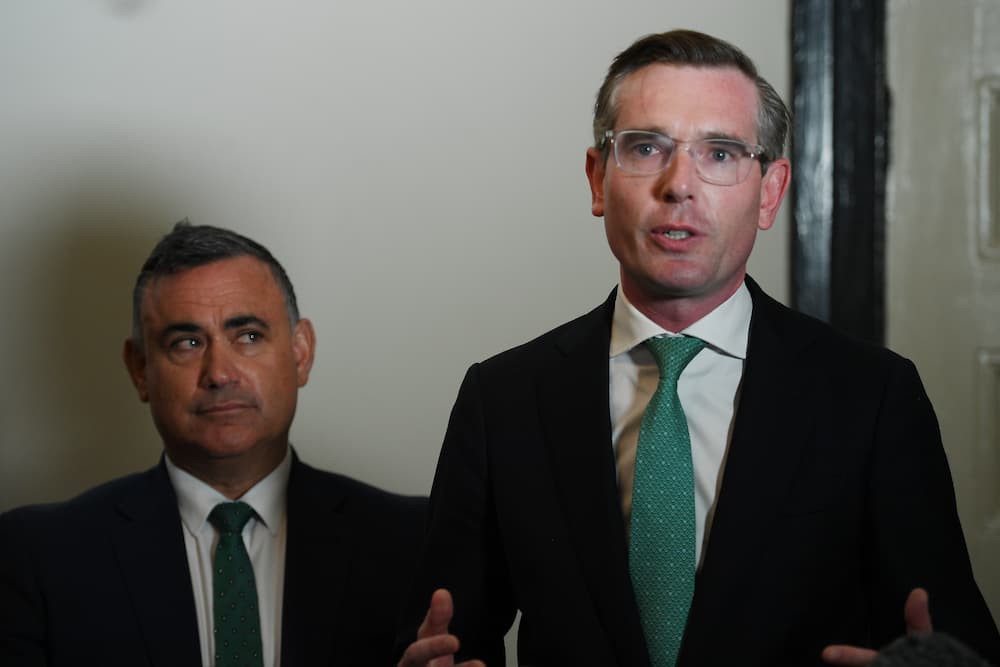NSW Premier Dominic Perrottet has defended his Trade Minister Stuart Ayres amid claims the government misled parliament over a US trade job controversially handed to former Nationals leader John Barilaro.
A parliamentary inquiry is probing the propriety of Mr Barilaro’s appointment to the $500,000 a year New York-based role amid ongoing backlash over the decision.
On Tuesday, government documents provided to the upper house inquiry revealed Mr Perrottet as treasurer received a ministerial briefing last year on the chosen candidate for the lucrative role.
Mr Barilaro, then-premier Gladys Berejiklian and then-investment minister Mr Ayres were informed by Investment NSW in August that senior public servant Jenny West was an independent recruitment panel’s preferred candidate, the documents indicate.
They show Mr Ayres signed off on the briefing on August 17, acknowledging “the successful candidate is Ms Jenny West”, and that a meeting was planned between Ms West and the premier to discuss trade priorities prior to her move to New York.
The government has previously said a first recruitment process did not identify a suitable candidate, leading to a second recruitment process going ahead.
Labor finance spokesman Daniel Mookhey described the new trove of documents as “devastating” for the government, claiming they showed Mr Perrottet and Mr Ayres were both told Ms West was the best person for the job.
Mr Mookhey said the government had waged a “four-week war” blocking the release of the documents, with more than 100 files still marked secret.
“The documents indicate very strongly that Dominic Perrottet and Stuart Ayres knowingly and deliberately misled the parliament on June 22 this year when they said that there was no suitable candidate found in the first process,” he told reporters in Sydney.
Mr Ayres distanced himself from the new documents, saying the ministerial brief was “noted” by him, but was not a brief that “seeks a decision from me”.
“I would also like to make clear that this brief does not represent the end of the recruitment process. That could only be determined by the CEO of Investment NSW as this is public service appointment,” he said in a statement.
“This is consistent with testimony provided by the Investment NSW CEO and General-Counsel … and the information I provided to the Legislative Assembly during question time.”
Asked if Mr Ayres had misled parliament on the issue, Mr Perrottet said the advice he had received was “there was no suitable candidate and that was what was provided to me by the Department of Enterprise, Investment and Trade”.
“What Minister Ayres in his statement has put out is that the noting brief that he signed was not at the end of the process and therefore a suitable candidate was not found,” he told reporters in Seoul, South Korea, where he is on a trade mission.
The premier rejected a suggestion that Mr Ayres should be sacked over the affair, describing him as a “very strong minister in the NSW government”.
Ms West has told the inquiry she was offered the job and subsequently lost her senior job at Investment NSW after it was withdrawn.
The plum appointment eventually went to Mr Barilaro, who last month relinquished the role amid a public controversy, saying it had become untenable.
The release of the documents comes after weeks of pressure on the government to provide the inquiry with a swathe of sensitive files about Mr Barilaro’s appointment to the lucrative taxpayer-funded trade job.
The NSW upper house has been recalled to sit on Friday in an effort to obtain documents needed to examine the appointment. That sitting will proceed unless all the requested documents are provided.
The committee has already triggered Standing Order 52 to compel the government to hand over the documents.
The inquiry’s chair, Greens MP Cate Faehrmann, has invited Mr Barilaro to make a written submission and has indicated he will be called as a witness at a later date.
The former deputy premier has previously criticised the inquiry for failing to call him, saying the drip feed of public information goes against procedural fairness.



